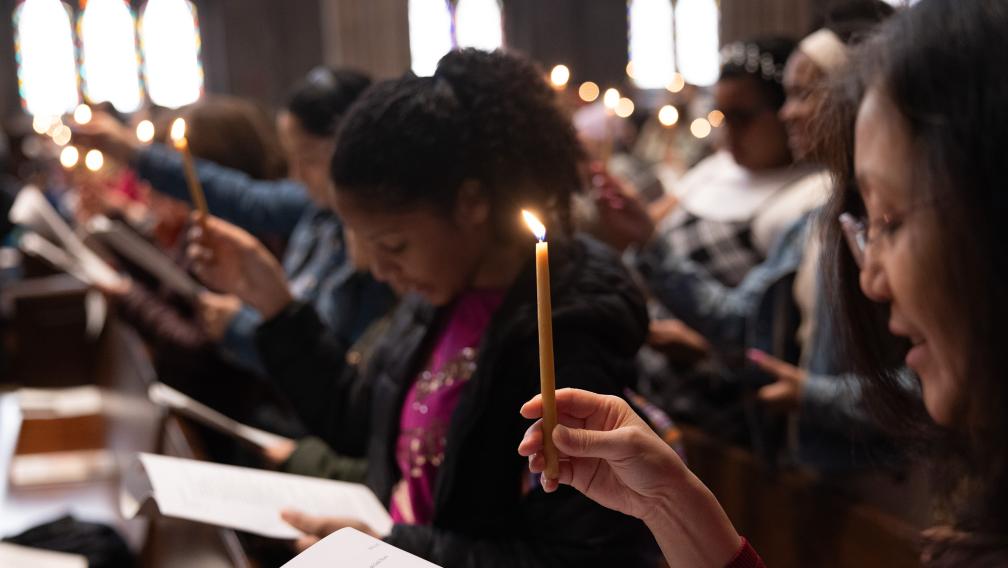Pentecost: The Holy Spirit In Us

“When the day of Pentecost had come, they were all together in one place. And suddenly from heaven there came a sound like the rush of a violent wind, and it filled the entire house where they were sitting.” — Acts 2:1–2
The scriptural account of Pentecost is extraordinary — both the culmination and the beginning of a sweeping and consequential story. Jesus has been crucified, resurrected, and lifted up into heaven, leaving his followers with a promise: “The Advocate, the Holy Spirit, whom [God] will send in my name, will teach you everything and remind you of all that I have said to you.”
Jesus’s followers, including women, are gathered in a house when “a sound like the rush of a violent wind” fills the space. “Divided tongues” of fire appear on them, and they begin to speak in other languages. The noise draws a crowd, a mix of folks from “every nation,” and each hears Jesus’s followers’ words in their own language. They’re amazed and astonished and rightly ask “What does this mean?” Others scoff, brushing it off as a case of drunkenness.
Then and now, the language of the Holy Spirit transcends the boundaries and limits of culture, country, heart, and mind.
Peter, one of the twelve disciples, gets up and says, firstly, they’re not drunk — it’s only nine o’clock in the morning — then he gives real-time context by reciting the prophet Joel: “In the last days it will be, God declares, that I will pour out my Spirit on all flesh” — all ages, all genders — then everyone will dream dreams, everyone will see visions, and everyone will prophesy. While the details of what exactly happened that day are still being disputed by scholars, skeptics, and seekers, the result is undeniable: a global movement that has endured and evolved for two-thousand years.
Then and now, the language of the Holy Spirit — the divine within us — transcends the boundaries and limits of culture, country, heart, and mind. Inside each of us exists an inner knowing that goes beyond belief. The breath of God animates within us a uniquely human and holy imagination that dreams and envisions a reality beyond the present: a world where all our needs are met; a world where hierarchies are flipped upside down and tossed aside altogether; a world created anew through patient, joyful, and loving collaboration with God and one another.
Each of us holds a piece of that vision pulsing at the heart of Jesus’s message, and when, in community, we discern, nurture, and act on our part, we prophesy with our lives. Together we become the future we first see inside: the imperfect and healing and whole body of Christ. We become the Church.
Here are five ways to think about becoming church, from the inside out:
Social Justice “At Pentecost we are reminded that we can be diverse but still be of ‘one heart and mind’ through the Spirit of God,” writes activist Shane Claiborne. “And unity does not mean uniformity. To harmonize does not mean we homogenize. In fact any good harmony has lots of different voices, just like that early Church.”
Poetry Together is a key word in the story of Pentecost and in the Rev. Jan Richardson’s poem “When We Breathe Together”:
This is the blessing
we cannot speak
by ourselves.
Essay Author and teacher Dan Clendenin digs into early Christian art — images that were “not merely decorative but intentionally devotional” — and the symbolism of the dove. “In the earliest art of the first believers, the Holy Spirit is a dove of peace,” he writes. “The descent of the dove brings us everything that nourishes human wholeness and well-being. Jesus called it ‘my peace that the world cannot give.’”
Music For your enjoyment, an eclectic Pentecost playlist featuring wind, fire, unity, and peace: “Blowin’ in the Wind” by Bob Dylan, “Fire” by CeCe Winans, “One Love” by Bob Marley & The Wailers, and J.S. Bach’s “Dona Nobis Pacem” (“Give Us Peace”).
Theology The Feast of Pentecost is “a great leveller,” writes poet and theologian Pádraig Ó Tuama. “It is a way of saying the face of God is the face of your neighbour; the voice of God is the voice of your neighbour; the language of God is the language of your neighbour, yes, even the neighbour you despise.”





